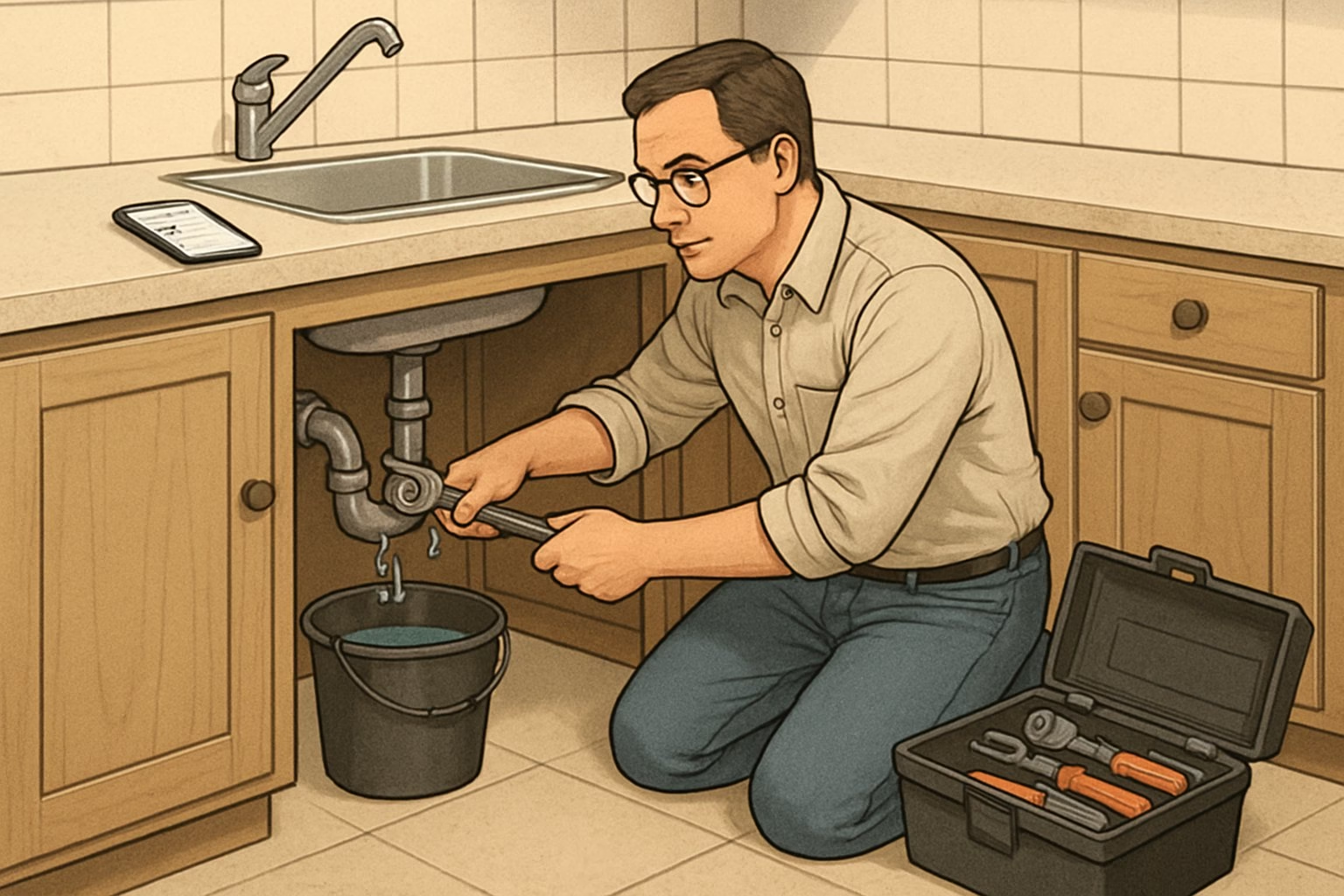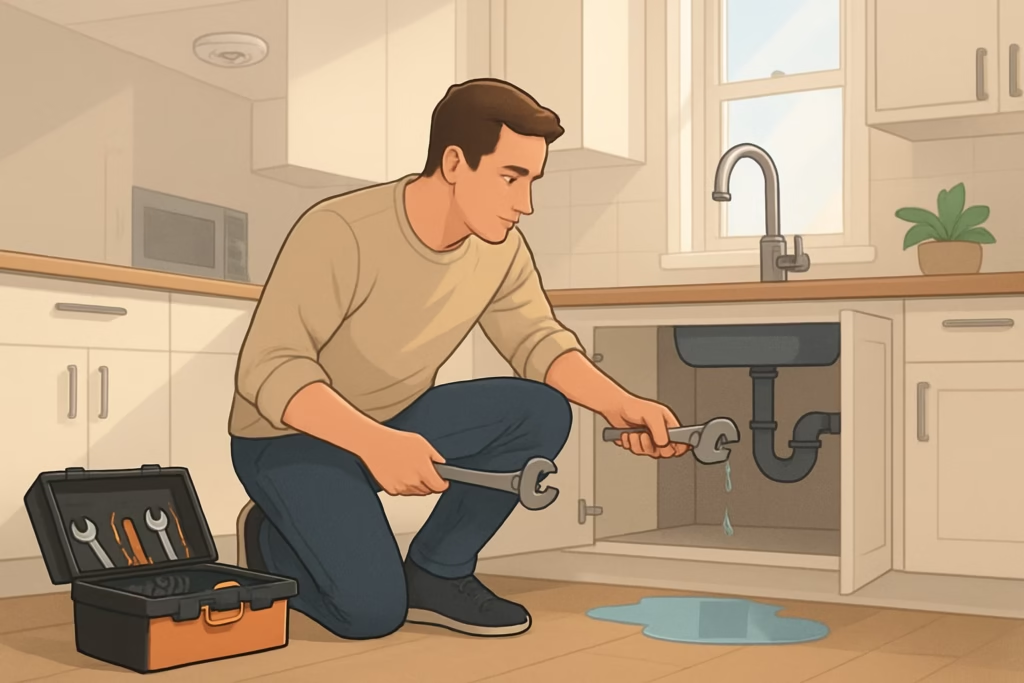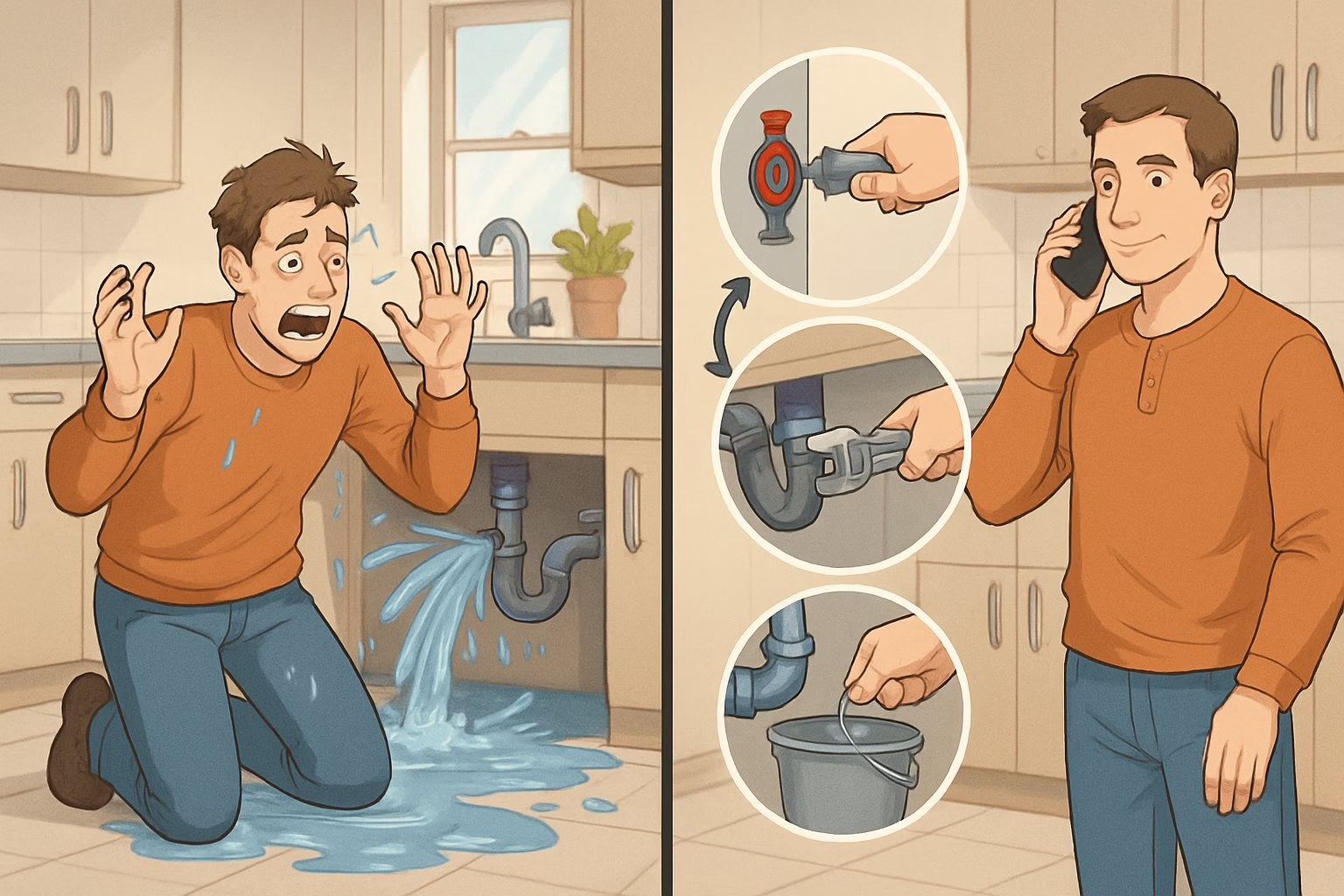Home repair emergencies sneak up on everyone eventually. Maybe a pipe bursts in the basement, your roof starts leaking in a storm, or the heater quits on the coldest night of the year.
It feels overwhelming, but acting fast (and not freaking out) can save you a ton of money and headaches.

The trick to surviving a home emergency? Move quickly, stay calm, and follow the right steps in order.
People often make expensive mistakes because they panic or try to fix things they shouldn’t. Some emergencies need you to act right away, while others are best left to the pros.
This guide lays out what to do when disaster hits at home. You’ll spot real emergencies, know what to do first, figure out when to call for help, and how to find legit professionals quickly.
Having a plan—before you need it—could make all the difference for your home and your wallet.
Key Takeaways
- Act fast to stop more damage—shut off water, power, or gas before calling anyone.
- Know which emergencies need pros right now and which you can patch up temporarily.
- Prep an emergency contact list and stash some basic supplies so you’re not scrambling later.
What Qualifies as a Home Repair Emergency?

Home repair emergencies are problems that put your health, safety, or property at serious risk. These need attention right away to stop injuries or big damage.
Safety threats top the list. Gas leaks mean fire or explosion risks. Electrical issues—like exposed wires or sparking outlets—could start a fire or shock someone.
Water emergencies like burst or broken pipes and major leaks can destroy floors, walls, and your stuff in no time. Standing water is a nightmare.
Structural damage—like a roof leak pouring water inside—makes your home unsafe. Chemical spills also count since they’re bad for your health.
Common home repair emergencies include:
- Gas leaks – get everyone out, now
- Burst or broken pipes – shut off the water main
- Electrical hazards – turn off the breaker
- Major roof leaks – move your stuff to safety
- Flooding or standing water – take photos for insurance
- Chemical spills – open windows and call poison control
Temperature problems matter too. No heat in winter or no AC in a heatwave can be dangerous, especially for kids and older folks.
Non-emergencies? That’s stuff like small leaks, cosmetic damage, or anything that doesn’t put safety at risk. Those can usually wait.
Immediate Steps to Take (Before Calling Anyone)
When disaster strikes, what you do in the first few minutes can make a huge difference. Take a breath, then check things out quickly.
Look for immediate safety risks—like water near outlets or the smell of gas. If you smell gas, don’t mess around. Get out and call the gas company.
Turn Off Utilities When Needed
For water emergencies, find the main shutoff valve and turn it off. This stops water before it floods everywhere.
For electrical problems, head to your breaker box. If you see sparks or smell burning, shut off power to that area.
If the power’s out everywhere, peek outside to see if neighbors have power. That helps you figure out if it’s just you or the whole block.
Protect Your Property
Grab a tarp to cover leaks or busted windows. It’s not pretty, but it keeps more water out.
Move your stuff away from the mess. Snap photos of everything for insurance.
| Emergency Type | Quick Action |
|---|---|
| Water leak | Find shut-off valve |
| Electrical issue | Turn off circuit breaker |
| Roof damage | Cover with tarp |
| Gas smell | Leave house immediately |
Clear a path for repair crews. If it’s dark, turn on some lights so they can see the problem areas.
Take plenty of pictures. Jot down what happened and when—your future self will thank you.
What Not to Do in a Panic

Panic is the enemy during a home emergency. It’s easy to make things worse if you’re not careful.
Don’t rush into dangerous areas. Never go into flooded basements or rooms with electrical damage. Water and electricity are a deadly mix.
Stay away from downed power lines. If you see one, don’t even get close—call the utility company and let them handle it.
Don’t ignore gas smells. Never flip switches or use a lighter if you smell gas. Just get out and call from outside.
Skip climbing on wet roofs. Even if water’s pouring in, it’s not worth the risk. Wet roofs are slippery and dangerous.
Don’t mess with utilities if you’re unsure. Turning the wrong valve or breaker can make things worse. Learn where everything is before you’re in a jam.
Never run a generator indoors. Not even in the garage. Carbon monoxide sneaks up fast and can be deadly.
Don’t try major electrical fixes yourself. Resetting a breaker is fine, but leave the rest to pros. Shock or fire isn’t worth it.
Unplug damaged appliances. If something got wet or looks off, unplug it. Even if it seems okay now, it could cause trouble later.
When to Call a Professional (And Who to Call)
Some emergencies just aren’t DIY jobs. If there’s a risk to safety or major property damage, call in the pros.
Call emergency services right away for gas leaks, electrical fires, or if the house structure seems unsafe. You want trained experts with the right gear.
Emergency Situations That Need Pros
| Problem Type | Who to Call | Why |
|---|---|---|
| Electrical issues | Electricians | Risk of fire or shock |
| Major water leaks | Plumbers | Prevent flooding damage |
| Gas leaks | Emergency services first | Life-threatening situation |
| Structural damage | General contractor | Building safety concerns |
For sparking outlets or power outages, call a licensed electrician. Don’t try to fix wiring yourself in an emergency.
Major plumbing disasters—burst pipes, sewer backups, water heater failures—call for a plumber, not a YouTube video.
Contact your insurance company right away if you think it’s covered. Most have 24-hour claim lines. The faster you file, the sooner you get help (and maybe reimbursement).
Take photos and videos before anyone starts repairs. Save receipts from any emergency work.
Get multiple quotes if you can, but don’t wait on safety fixes just to save a few bucks.
Always check that emergency contractors are licensed and insured before they start working.
How to Find Help Fast (Without Guesswork)
When you need repairs right now, don’t waste time. Start with your homeowner’s insurance company.
Give them a call and ask if the emergency is covered. Stuff like storm damage or burst pipes often is.
Quick Help Sources:
- Your insurance company’s go-to contractors
- LocalRepairsNow.com for trusted local pros
- Government help (dial 211 for programs)
- Emergency repair hotlines in your city
Insurance agents usually have a list of contractors they trust, and those folks know how to handle claims. It can make things go smoother.
If insurance won’t cover it or you need more help, government programs like FEMA or local housing departments sometimes offer emergency repair grants.
For immediate action:
- Take photos of the damage
- Call your insurance company
- Search LocalRepairsNow.com for emergency help
- Dial 211 for local assistance
Lots of cities have emergency home repair assistance if you’re low on funds or need extra support.
Real estate agents can also point you to reliable contractors—they deal with this stuff all the time.
Skip the guesswork and use these trusted channels. They’ll connect you with licensed, insured pros who know what they’re doing.
Write down these resources before you need them. Scrambling for a number during an emergency is the last thing you want.
If you ever find yourself in a bind and need fast, reliable help, check out LocalRepairsNow.com to connect with qualified local professionals for emergency repairs.
Preparing Now for the Next Time
Build an emergency fund just for home repairs. Try to set aside at least 1% of your home’s value every year.
If your house is worth $200,000, you’ll want about $2,000 stashed away for those “oh no” moments.
Create a comprehensive emergency kit with the essentials. Toss in flashlights, batteries, first aid stuff, and some basic tools.
Keep everything somewhere you can actually find it when you’re stressed and scrambling.
| Emergency Kit Essentials | Purpose |
|---|---|
| Flashlights & batteries | Power outages |
| First aid supplies | Minor injuries |
| Basic tools | Quick fixes |
| Water shut-off wrench | Pipe emergencies |
| Tarps & plastic sheeting | Roof leaks |
Schedule regular inspections so you catch problems before they get out of hand. At least once a year, check your roof, plumbing, and electrical systems.
It’s also smart to do a quick monthly check on smoke detectors and areas around water sources. A little effort goes a long way.
Document everything about your home systems. Snap photos of your electrical panel, water shut-off valve, and your HVAC setup.
Keep all your warranty info and repair records together, maybe in a folder or even just a shoebox. Whatever works.
Find trusted contractors before you need them. Do some research on local pros and save their numbers somewhere handy.
Know your home’s main shut-offs. Figure out how to turn off the water, gas, and electricity. Practice these steps so you’re not fumbling during a crisis.
Review your insurance policy annually. Know what’s covered and what your deductible is. Keep the policy where you can grab it fast if you need it.
Create a family emergency plan that spells out who to call and where to meet. Make sure everyone gets the basics of what to do if something goes wrong.
Frequently Asked Questions
Home repair emergencies are stressful—no doubt about it. Most folks have a lot of questions about what to do, who to call, and what it’s all going to cost.
How should homeowners prepare for unexpected repair emergencies?
Start by making an emergency contact list with local plumbers, electricians, and contractors. Save it on your phone and stick a copy on the fridge.
Find your main water shutoff valve, electrical panel, and gas shutoff. Practice turning these off—you don’t want to be guessing when things get hectic.
Set up an emergency fund that covers three to six months of expenses, including money just for home repairs.
Keep basic emergency supplies on hand. Stock up on flashlights, batteries, duct tape, plastic sheeting, and some tools.
Schedule regular maintenance for your home’s big systems. Annual checkups on plumbing, electrical, and HVAC can save you a ton of trouble later.
What are the initial steps to take when a home repair crisis occurs?
Try to stay calm and size up the situation. Is anyone in danger? Is the problem getting worse?
If you need to, shut off the water, electricity, or gas. Don’t wait if you smell gas or see sparks.
Move people and anything valuable away from the area that’s affected. You want to avoid injuries and limit the damage.
Take photos of the damage before you start any temporary fixes. These come in handy for insurance and when you talk to the pros.
If there’s immediate danger, call 911. Fires, gas leaks, or electrical hazards are nothing to mess around with.
Which professionals should be contacted first during a home repair emergency?
If people or property are at risk, call emergency services first—fires, gas leaks, or serious structural trouble can’t wait.
For burst pipes or sewage backups, call a licensed plumber. They’ll stop the water damage fast.
If you’re dealing with sparking outlets, burning smells, or partial power outages, you need an electrician. Don’t touch damaged electrical stuff yourself.
Roof leaking like crazy? Call a roofing contractor. Quick patches might not cut it in rough weather.
What are the key considerations when budgeting for sudden home repairs?
Emergency repairs usually cost 20-50% more than planned ones. After-hours and urgent calls come with premium price tags.
Try to get written estimates before the work starts. Good contractors will give you a ballpark, even in a rush.
Check if your homeowner’s insurance covers the damage. Burst pipes are often covered, but slow leaks probably aren’t.
For big repairs, look at financing options. Home equity lines or personal loans usually beat credit cards on interest rates.
Fix anything that affects safety or could get worse right away. Less urgent stuff can wait until you can shop around.
How can homeowners identify whether an issue qualifies as a repair emergency?
If water’s flooding your home or hitting anything electrical, that’s an emergency. A slow drip from a faucet can probably wait.
Electrical problems are urgent if you see sparks, smell burning, or lose power to key areas. Flickering lights? Not so much.
If you smell gas, get out and call for help. Don’t try to fix it yourself—just don’t.
Structural damage is serious if you see sagging or cracking in walls, ceilings, or floors. That’s a safety risk.
When it’s extremely hot or cold and your HVAC gives out, that’s an emergency too. Health comes first.
What safeguards can be put in place to minimize the impact of home repair emergencies?
Install water detection alarms around water heaters and washing machines. Don’t forget about the basement—those alarms can really save the day down there.
Book a pro for yearly inspections on your big systems. Plumbers, electricians, and HVAC techs usually notice issues long before they turn into disasters.
If you’ve got really old appliances or systems, replace them before they call it quits on you. Water heaters that are older than ten years and HVAC units over fifteen are just ticking time bombs sometimes.
Trim any trees hanging near your roof or power lines. You’d be surprised how often storm damage comes from a rogue branch.
Look over your homeowner’s insurance every year. Make sure your coverage actually matches what it would cost to replace your stuff now—it’s easy to fall behind.
